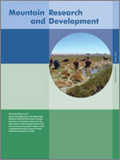
MOUNTAIN RESEARCH AND DEVELOPMENT
Scope & Guideline
Exploring the intersection of research and mountain sustainability.
Introduction
Aims and Scopes
- Interdisciplinary Research:
The journal encourages contributions from various fields such as ecology, sociology, economics, and cultural studies, fostering a holistic understanding of mountain systems. - Climate Change and Adaptation:
A core focus is on the impacts of climate change in mountainous regions, exploring adaptive strategies and resilience-building among local communities. - Sustainable Development Practices:
Research often centers on sustainable practices in agriculture, tourism, and resource management, aimed at enhancing the livelihoods of mountain populations while conserving their environments. - Social-Ecological Systems:
The journal emphasizes the integration of social and ecological perspectives, examining how these systems interact and influence each other in mountain settings. - Cultural Heritage and Local Knowledge:
Studies frequently investigate the role of indigenous knowledge and cultural practices in managing mountain resources and fostering sustainability. - Biodiversity and Conservation:
The preservation of biodiversity in mountain ecosystems is a significant theme, with research highlighting conservation strategies and the impacts of human activity on these fragile environments.
Trending and Emerging
- Climate Change Adaptation and Resilience:
Recent publications emphasize adaptive strategies for communities facing climate change, showcasing innovative solutions and resilience-building measures in mountain environments. - Socio-Ecological Research:
There is a rising trend in studies that explore the interconnections between social and ecological systems, focusing on how these relationships can inform sustainable practices and policies. - Community Engagement and Local Knowledge:
Emerging research highlights the importance of community participation and the integration of local knowledge in decision-making processes related to mountain resource management. - Biodiversity Conservation in Mountain Ecosystems:
An increasing number of articles are dedicated to conservation efforts and biodiversity studies, reflecting a heightened awareness of the ecological significance of mountain regions. - Impact of Tourism on Mountain Economies:
The relationship between tourism and local economies is gaining attention, with research exploring sustainable tourism practices and their implications for mountain communities.
Declining or Waning
- Traditional Agricultural Practices:
Research on traditional agricultural methods and their challenges has decreased, possibly due to a growing emphasis on modernization and technological interventions in mountain farming. - Urbanization Impacts in Mountain Regions:
Although urbanization remains a relevant issue, specific studies focusing solely on urbanization trends in mountainous areas have become less frequent, suggesting a shift towards broader socio-economic analyses. - Historical Studies of Mountain Communities:
There appears to be a decline in research centered on historical perspectives of mountain communities, as contemporary issues and immediate challenges gain more attention. - Single-Sector Focus Research:
There is a noticeable reduction in studies concentrating exclusively on one sector (e.g., forestry or tourism), with a growing trend towards interdisciplinary approaches that encompass multiple sectors.
Similar Journals

AMBIO
Pioneering research at the intersection of ecology and society.AMBIO, published by Springer, is a prestigious journal that has been at the forefront of environmental research since its inception in 1973. With an ISSN of 0044-7447 and an E-ISSN of 1654-7209, this journal provides a vital platform for the dissemination of interdisciplinary studies that intersect ecology, environmental chemistry, geography, and medicine. Based in the Netherlands, AMBIO holds a remarkable position in the academic world, ranked Q1 in multiple categories, including Ecology and Environmental Chemistry, reflecting its commitment to high-quality scholarly work. Researchers looking to contribute to or stay abreast of significant advancements in understanding and addressing contemporary environmental challenges will find AMBIO to be an essential resource, catering to the needs of a diverse audience comprising scholars, practitioners, and policymakers. While the journal is not open access, its wide-ranging influence in the social sciences, particularly regarding geography and development, alongside its high impact factor, underscores its importance for the future of environmental research.

All Earth
Fostering Interdisciplinary Dialogue on Environmental IssuesAll Earth is an esteemed open-access journal published by Taylor & Francis Ltd, dedicated to multidisciplinary research in the fields of Earth and Planetary Sciences, Global and Planetary Change, as well as Management, Monitoring, Policy, and Law. Since its inception in 2021, All Earth has swiftly positioned itself in the academic community, achieving notable rankings such as Q2 in Earth and Planetary Sciences and Q3 in related fields, showcasing its commitment to high-quality interdisciplinary scholarship. Researchers and professionals can benefit from its accessible content, which contributes to the ongoing discourse on critical environmental issues and innovative solutions for sustainable development. The journal is based in the United Kingdom and continues to be a vital source of information and inspiration for students and scholars aiming to tackle the pressing challenges of our planet through rigorous scientific inquiry and policy analysis.

Journal of Mountain Science
Navigating the Challenges of Mountain EcosystemsThe Journal of Mountain Science, published by SCIENCE PRESS, is a distinguished academic journal dedicated to advancing the understanding of mountain environments and their significance in various scientific domains. With an ISSN of 1672-6316 and an E-ISSN of 1993-0321, this journal has carved a niche in the field of Earth sciences, earning a commendable Q2 ranking in categories such as Earth-Surface Processes, Geography, Planning and Development, and Geology, as well as a Q3 ranking in Global and Planetary Change. Since its inception in 2007, the journal has been pivotal in fostering interdisciplinary research that addresses critical environmental issues, making it an essential resource for researchers, professionals, and students alike. While currently not offering open access, it provides valuable insights into areas including nature conservation and landscape management, with a focus on the unique challenges faced by mountainous regions. Located in Beijing, China, the Journal of Mountain Science continues to promote scholarly discourse that contributes to the sustainable development of mountain communities and ecosystems until 2024 and beyond.
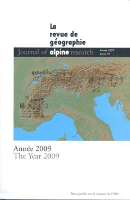
Revue de Geographie Alpine-Journal of Alpine Research
Empowering Researchers to Elevate Alpine StudiesRevue de Geographie Alpine-Journal of Alpine Research is a distinguished academic journal published by IGA-ASSOC DIFFUSION RECHERCHE ALPINE, focusing on the multifaceted disciplines of geography, environmental science, and alpine research. Since its inception in 1977, this peer-reviewed journal has established itself as a vital resource for scholars aiming to contribute to the understanding of Alpine environments, cultures, and issues related to sustainability. With an open-access model since 2007, the journal provides unrestricted access to its rich repository of research, enhancing visibility and global collaboration among researchers. The journal is indexed in Scopus and has been categorized in the Q4 quartile for both Earth-Surface Processes and Geography, Planning and Development as of 2023, positioning it as a relevant yet emerging platform within the academic community. The Revue de Geographie Alpine is committed to fostering dialogue and knowledge-sharing among researchers, professionals, and students dedicated to alpine studies, making it an essential contribution to the field.

Geography and Sustainability
Navigating the Future of Our Planet.Geography and Sustainability is a prestigious, peer-reviewed journal published by Elsevier, focusing on the interdisciplinary fields of geography, ecology, and environmental science. As an Open Access publication since 2020, it aims to provide a platform for the dissemination of high-quality research that addresses critical sustainability challenges facing our planet. Based in China, the journal navigates through an impressive array of categories, all classified in the Q1 Quartile rankings for 2023, showcasing its top-tier status in areas such as Earth-Surface Processes, Geography, Planning and Development, and Nature and Landscape Conservation. With its notable impact factors—ranked 2nd in Earth and Planetary Sciences and 3rd in Environmental Science—it attracts contributions from leading experts and emerging scholars alike. Researchers, professionals, and students seeking to advance the scientific understanding of sustainability and its geographical implications will find indispensable resources and innovative findings within the pages of this journal.
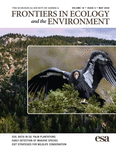
FRONTIERS IN ECOLOGY AND THE ENVIRONMENT
Pioneering pathways to a greener tomorrow.FRONTIERS IN ECOLOGY AND THE ENVIRONMENT, a prestigious journal published by Wiley, serves as a leading platform for disseminating high-quality research in the dynamic fields of ecology, evolution, and environmental science. With an impressive impact factor and ranked in the top tier (Q1) across multiple categories, including Ecology and Ecology, Evolution, Behavior and Systematics, this journal holds an esteemed position in the scholarly community, reflecting its rigorous peer-review process and the significance of its contributions. Boasting a Scopus rank of #11 out of 721 in its primary category and #10 out of 461 in Environmental Science, this journal is at the forefront of ecological research and influences future developments in the field. As an open-access journal, it seeks to promote the widest possible dissemination of research findings, allowing researchers, professionals, and students in the field of ecology and environmental science to stay informed and engaged with the latest advancements from 2003 through to 2024. Located in Hoboken, New Jersey, the journal invites submissions that traverse theoretical and practical aspects of ecology, facilitating collaborative efforts to address pressing environmental challenges.
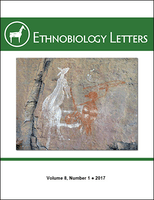
Ethnobiology Letters
Cultivating Understanding of Ethnobiological RelationshipsEthnobiology Letters is a pioneering journal in the field of ethnobiology, dedicated to the scientific study and documentation of the intricate relationships between human cultures and biological diversity. Published by the Société d'Éthnobiologie, this open-access journal has been providing an invaluable platform for researchers and scholars since its inception in 2010. Operating under the ISSN 2159-8126, it aims to promote accessibility and dissemination of knowledge across global communities by making its content freely available. Its contributions have garnered recognition in the realms of anthropology and agricultural sciences, achieving notable ranks in Scopus with a percentile standing in the 56th for Social Sciences and 41st for Agricultural and Biological Sciences. By fostering interdisciplinary dialogue and sharing innovative research, Ethnobiology Letters serves as a crucial resource for academics, practitioners, and students engaged in the exploration of the cultural dimensions of biodiversity.

International Journal of Conservation Science
Driving Impactful Change through Open Access KnowledgeThe International Journal of Conservation Science, published by the Romanian Inventors Forum, is a premier, Open Access journal dedicated to advancing the field of conservation science since its foundation in 2010. With a strong emphasis on interdisciplinary research, the journal welcomes contributions that explore innovative methodologies and sustainable practices in conservation. Based in Romania, the journal boasts an impact factor that positions it as a leading voice in its field, reflected by its Q1 ranking in Conservation and notable placements within its categories in Scopus. With coverage spanning diverse areas from natural resource management to environmental education, the journal serves as a crucial platform for researchers, policymakers, and practitioners aiming to drive impactful conservation strategies globally. The International Journal of Conservation Science not only enhances the visibility of significant research but also promotes open dialogue and collaboration among professionals committed to preserving our natural heritage.
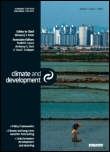
Climate and Development
Championing Research that Shapes Policy and PracticeClimate and Development is a leading interdisciplinary journal dedicated to addressing the multifaceted challenges posed by climate change and its intersection with sustainable development. Published by Taylor & Francis Ltd, this esteemed journal, with an ISSN of 1756-5529 and E-ISSN 1756-5537, provides a platform for innovative research that informs policy and practice across the globe. With its remarkable impact factor and recognized standing in the Q1 categories for Development and Geography, Planning and Development, along with notable positions in Global and Planetary Change, the journal is ranked in the top percentiles of Scopus, solidifying its influence within key academic fields. Climate and Development seeks to publish high-quality research articles, reviews, and case studies that contribute to a nuanced understanding of the implications of climate phenomena on socio-economic frameworks. This journal is essential for researchers, professionals, and students aiming to enhance their understanding of climate issues and contribute to sustainable development initiatives, ultimately striving for resilience in vulnerable communities around the world.

Eco mont-Journal on Protected Mountain Areas Research
Pioneering sustainable solutions for mountain ecosystems.Eco mont-Journal on Protected Mountain Areas Research, published by the AUSTRIAN ACAD SCIENCES PRESS, UNIV INNSBRUCK, is a pioneering open-access journal dedicated to advancing knowledge in the fields of ecology, nature conservation, and the management of protected mountain areas. Established in 2009, this journal aims to publish innovative research, policy analyses, and management strategies that contribute to the sustainable development and conservation of mountain ecosystems. With a recognition of its importance within the environmental science community, Eco mont has been progressively indexed with Scopus ranks in various categories, reflecting its growing influence in the fields of nature and landscape conservation as well as ecology. As a vital platform for researchers, professionals, and students interested in the complexities and challenges of mountain area conservation, Eco mont provides immediate and widely accessible insights crucial for informed decision-making and policy formulation in mountainous environments.